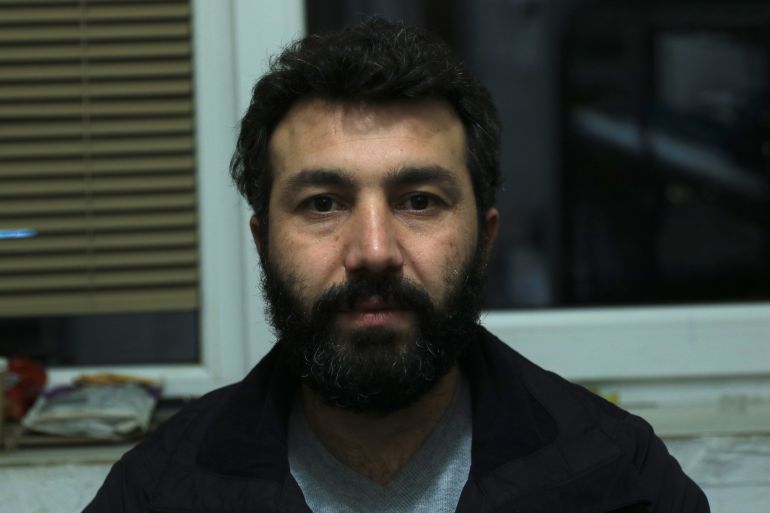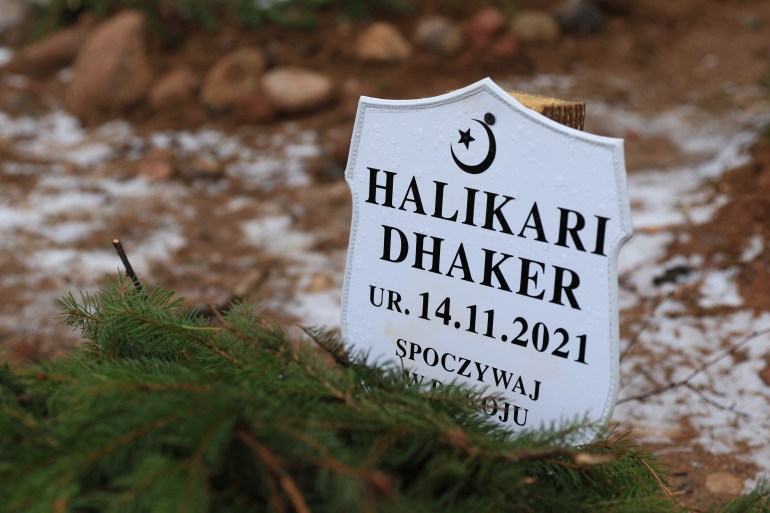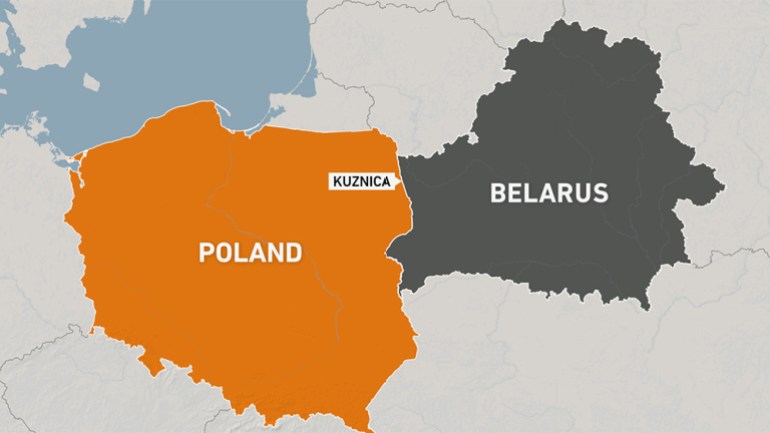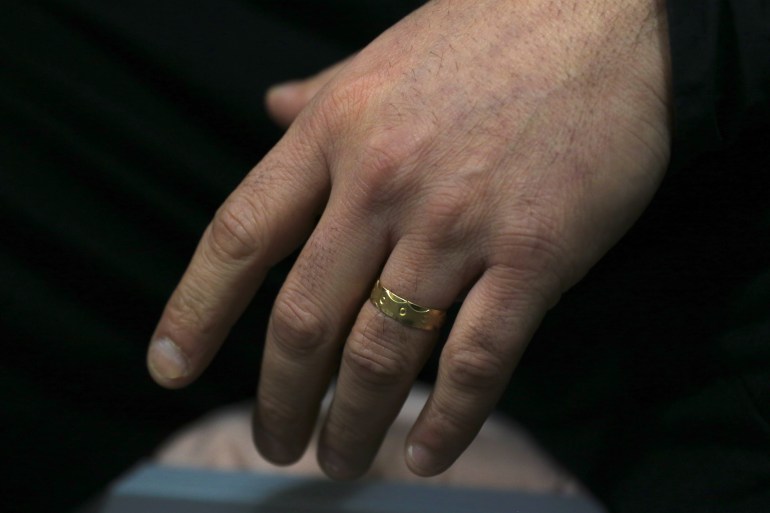Widowed in Poland: An Iraqi Kurdish victim of the border-crisis
Murad’s wife died from hypothermia and sepsis. The couple’s stillborn son is now buried near the Belarusian border.

Białystok, Poland – On the night of November 12, a Friday, Baravan Huzni Murad carried his ailing wife, Avin Irfan Zahir, to a forest road in northeastern Poland and called for help.
Murad, Zahir, and their five children had been walking through woodlands for four days after covertly crossing into Poland from Belarus, where they had arrived almost three weeks earlier in quest of a better life.
Keep reading
list of 4 itemsBelarus: Opposition leader Tikhanovsky jailed for 18 years
US, EU, UK and Canada announce new sanctions on Belarus
Belarus set up fake accounts to inflame migrants: Facebook’s Meta
As they attempted to travel further into Poland through the forests, they were also trying to hide from Polish authorities, fearful they would be pushed back to Belarus.
But Zahir grew severely ill, and the Polish humanitarian coalition Grupa Granica summoned an ambulance on Murad’s behalf after witnessing her dire condition.
The ambulance was accompanied by a vehicle from the Polish border authorities.
As he and his children were ushered into the vehicle to be taken to a nearby facility run by border police, Murad watched as his wife was taken away to a local hospital.
“At that time, my only worry, all my attention, was on my wife,” Murad told Al Jazeera. “All I could think of was if they would be able to help her. Would she ever be able to get up again?”
Neither Murad nor Zahir knew she was pregnant.
She died three weeks later, on December 3, at 38.

Halikari Dhaker, as he was named, was delivered as a stillborn baby on November 14.
Murad’s family paid a higher price than most who have crossed from Belarus to Poland since the border crisis began in August.
Western powers siding with Poland say Belarus masterminded the situation – which has seen thousands of people attempt to enter the European Union – in return for sanctions imposed on Minsk following President Alexander Lukashenko’s crackdown on dissent.
Despite facing incalculable loss, 35-year-old Murad still wants to make a life for his family in Poland.
He said after years of daily indignities in Iraq, the European country has provided him with basic human rights for the first time in his life.
Murad left his homeland, Zakho city in the Kurdish region of northern Iraq, on October 3.
“I sold everything, literally everything that I owned in my life, just to save my kids,” Murad said. “Because there is no life and future [in Kurdistan].”
A lack of jobs, corruption, and extreme water and electricity shortages in the Kurdish region are some of the reasons why Murad and others like him left.
Murad says he also had a more personal reason – he claims he was falsely imprisoned for murder by Kurdish authorities for six months before the real perpetrator was found. He alleges he never received an apology.
At the time of publishing, officials in the Kurdish region had not responded to Al Jazeera’s requests for comment regarding this accusation.
Having reached Belarus, Murad’s family crossed into Poland on November 8 through a tunnel other refugees and migrants had dug underneath the border fence.
Once in Poland, they walked for days without knowing where they were going. It was then that Zahir fell mortally ill.
According to Arsalan Azzaddin, a Kurdish doctor in northeastern Poland who was involved in Zahir’s case, there was little chance of recovery.
“From the beginning, there was no hope,” said Azzaddin, who works at a hospital in Bielsk Podlaski, a town a few hundred kilometres from the Belarusian border. “But in medicine, we cannot say that everything is lost. So you fight.”
Ultimately, Azzaddin said Zahir died of the combined effects of hypothermia and sepsis caused by the loss of her pregnancy, which had failed three weeks before she arrived at the hospital.
“Still, I don’t believe it,” Murad said about losing Zahir. “It’s hard to take.”
When he was informed of his wife’s passing, Murad and his family were being housed at a shelter for refugees and migrants in Białystok, run by the organisation Fundacja Dialog.
Murad’s friend Aras Palani, a Kurdish volunteer translator working with Grupa Granica, was with him at the time.
“I hugged him,” Palani said. “Everybody cried in the centre.”

Katarzyna Zdanowicz, the spokeswoman for the Polish Border Guard in Podlaskie province, said Zahir was one of the nine people confirmed to have died on Polish soil since the border crisis began.
Activists believe the real number to be significantly higher. As temperatures have plummeted in recent weeks, they say victims may be lying in the forests, yet undiscovered.
“It’s possible that the true number [of the dead] is larger,” said Ela, a field volunteer with Grupa Granica. “If grassroots assistance wasn’t there, surely this number would be much, much larger.”
Another Iraqi at the shelter, who requested anonymity, said given the perils of the journey so far, he ultimately regretted his choice to flee.
“They must close this route,” said the man, who is a member of Iraq’s persecuted Yazidi minority.
“If I had known the way would be like this, I would not have come.”
Palani, Murad’s friend, said the migrants who want to reach Europe are driven by more than economic factors.
“It’s not about the money,” he said. “[Murad] feels like everybody is taking care of him here. That’s a feeling he never knew.”
The kindness Murad and his family have received from Grupa Granica, hospital workers, and local Poles has convinced him to try and stay.
“I buried my son here,” Murad said. “I’m going to serve this country until I die.”
His other children, meanwhile, are struggling to make sense of their loss.
His young sons often cry or lay down on the floor alone, without reason. Murad said he is trying his best to be both a father and a mother to his children.
According to her parents’ wishes, Zahir’s body is slated to be returned for burial in the Kurdish region next month.
Murad wears one of her rings, as a way to keep her memory close. With tears in his eyes, he said it means “everything” to him.
“Whenever I look at this ring,” Murad said, “I will see her.”
